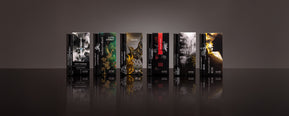You find a perfume that your friend wears.
It smells amazing, warm, soft, and full of character.
You try it on, expecting the same magic. But something changes. On your skin, it smells sharper, maybe sweeter, or not as rich.
It doesn’t smell bad. Just different.
This moment leaves many people wondering: Did the perfume change? Or is it just me?
The answer lies in how perfume works. It reacts with your skin, your body, and even your lifestyle. That’s why the same scent can tell a completely different story to someone else.
Let’s uncover what makes this happen and how to find a scent that tells your story best.
Why does the same perfume smell different on everyone?
Because fragrance is chemistry, not just in the bottle, but on the body. While the blend itself remains unchanged, the canvas it meets (your skin) alters the final impression.
Here are the six major factors that change how a perfume unfolds on each person:
- Your Skin’s pH Level
- Body Temperature
- Skin Type (Oily or Dry)
- Diet and Hormones
- Climate and Environment
- How You Apply It
These small things create a big impact, making each scent personal, and never quite the same on anyone else.
Now, move on to the first factor, the Skin’s pH level
1. The pH Levels Change How Perfume Smells on Everyone
Your skin’s natural balance, whether more acidic or alkaline, influences how a perfume unfolds.
- Higher pH levels can make the scent feel sharper or fade faster.
- Lower pH levels tend to bring out sweeter, deeper notes.
This subtle shift helps explain why the same perfume can feel soft and sweet on one person, yet crisp and fleeting on another.
But your skin’s chemistry is only the beginning. Temperature plays its own role.
2. Your Body Heat Speeds Up the Fragrance Drydown
Your body temperature acts like a silent partner in how scent develops.
- Warmer skin speeds up the evaporation, pulling out deeper notes more quickly.
- Cooler skin slows things down, letting lighter top notes linger longer.
This is why the same perfume may feel rich and bold on one person, yet soft and airy on another.
The way heat affects fragrance is closely tied to a scent’s evolution, especially the drydown phase, that final layer of the perfume journey when the deeper notes settle on your skin.
And once you factor in your skin type, the experience shifts again.
3. Perfume Clings Differently to Oily and Dry Skin
How oily or dry your skin is changes how perfume sticks with you.
- Oily skin helps perfume last longer because natural oils hold the scent in place.
- Dry skin, on the other hand, may cause fragrance to fade more quickly, especially light notes like citrus or floral tones.
To help perfume stay longer, try moisturizing your skin before spraying.
But even the best preparation can’t override what’s happening inside your body.
4. Food and Mood Influence Your Scent Profile
What you eat and how your hormones shift can subtly change your body’s natural scent.
- Foods like spices, red meat, or even caffeine can influence how a perfume smells on your skin.
- Hormonal changes from stress, menstruation, or pregnancy can also make a perfume feel unfamiliar, even if you’ve worn it before.
This explains why some people wonder, “Why does my perfume suddenly smell different on me?”
5. Seasonal Shifts Affect How a Perfume Smells
The time of year or the place you’re in can change how a scent wears.
- Humid, warm air often makes perfumes stronger and longer-lasting.
- Dry or cold weather tends to keep the fragrance closer to the skin, making it feel lighter or more muted.
If you want to understand how temperature and air impact your fragrance, explore our guide on the differences between summer and winter perfumes.
Finally, how you apply your perfume can bring out the best
6. Application Technique
Where and how you spray perfume changes how it performs.
- Applying to warm pulse points like wrists or behind the ears helps it develop fully.
- Spraying on hair or clothing gives a different scent trail, and may last longer or softer depending on the material.
To get the most from your fragrance, explore our full guide on how to apply perfume.
Then, what if you want the same scent on my skin?
Sometimes you fall in love with how a fragrance smells in the bottle or on someone else and wonder why it’s different on you.
The good news is, you can get closer to that same scent experience with these 5 steps:
- Prepare your skin first
- Pick the right type of perfume
- Let the perfume sit for 15–30 minutes
- Layer your perfume
- Know when and where you apply matters
When done right, they help the perfume stay closer to the way it smells in the bottle while still allowing it to feel personal. It all begins with the most important step: how you prepare your skin.
1. Prepare Your Skin First
Perfume holds better on moisturized skin. If your skin is dry, the scent may fade too fast or smell a little off.
- Apply an unscented lotion or natural oil before spraying.
- For even better results, dab a little petroleum jelly on your pulse points like wrists or neck, then spray the perfume over it. This locks in the scent longer.
2. Pick the Right Type of Perfume
Not all perfumes are the same. Some last longer and smell richer.
- Choose an eau de parfum instead of eau de toilette if you want a deeper and longer-lasting scent. These hold on your skin better than lighter types.
To know what the right type of perfume is, you can check out the difference between EDP, EDT, and EDC.
But no matter which type you choose, how you judge the scent on your skin matters too.
3. Let the Perfume Sit for 15 - 30 Minutes
Right after you spray it, the perfume can smell too strong, too sharp, too bright, or just not right.
- Wait at least 15 - 30 minutes before judging how it smells on your skin.
- The top notes fade, and the real scent (the heart and base) comes forward. That’s where the magic happens.
And if you want to give that scent even more strength and tell a different story on your perfume, then layering is your next step.
4. Layering Your Perfume
If you want the scent to last longer and smell more like it does in the bottle, try layering.
- Use a matching lotion, oil, or body wash if available.
- Or layer with another fragrance from the same scent family: woody with woody, musky with musky for more depth.
Need help? Read our guide on fragrance layering for more ideas.
Once your skin is prepped and layered, the final detail is knowing when and where to spray.
5. Know When and Where You Apply Matters
Where and when you apply it can change how the scent behaves.
- Pulse points like your wrists, neck, and inside your elbows are warmer and help the scent open up.
- Spray in the morning or before you head out, not when you’re overheated or sweaty.
- If you're outside in heat or wind, the scent may disappear faster or change.
Mastering the right moment and place to apply can make all the difference in how your perfume performs. But even with every tip, the truth remains that fragrance is deeply personal.
Conclusion: The Same Scent, a Different Story
Perfume really does smell different on everyone. And while that might feel frustrating at first, it’s also what makes fragrance special.
But with a few small steps, you can help the scent stay closer to what you love, while still letting it become yours.
Find the perfume that tells your story, softly, beautifully, and just the way it should. Explore Buchart Colbert’s collection and wear your scent your way.


